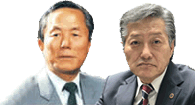Courtesy
From Beginning to End
Courtesy, our first tenet. When I was a color belt, I often wondered if General Choi purposefully listed courtesy as the first tenet. Or, was it just by coincidence that it became our first tenet? General Choi states in the TaeKwon-Do: The Korean Art of Self-Defence, “Taekwon-Do students should attempt to practice the following elements of courtesy to build up their noble character and to conduct the training in an orderly manner as well.”[1]
General Choi goes on to list each element of courtesy as follows[2]:
1. To promote the spirit of mutual concessions
2. To be ashamed of one’s vices, contempting those of others
3. To be polite to one another
4. To encourage the sense of justice and humanity
5. To distinguish instructor from student, senior from junior, and elder from younger
6. To behave oneself according to etiquette
7. To respect others’ possessions
8. To handle matters with fairness and sincerity
9. To refrain from giving or accepting any gift when in doubt
I started to realize that courtesy was a part of everything that we did, from the very first movement in Taekwon-Do, we start with a bow and we end with a bow. Courtesy has to permeate the Taekwon-Do student. How do we promote the spirit of mutual concessions? To promote something, you are trying to foster a behavior that becomes second nature. Mutual concessions is great wording for respecting the rights of others and their right to exist, while treating them as your equal. To treat someone as your equal, you have to believe that they have the same rights as you do and that you should treat them as you would want them to treat you.
“To be ashamed of our vices,” [3] we must purposefully try to improve ourselves. To achieve this goal, we have to realize that we are not perfect and that we are a work in progress. When our vices cause us to treat others in a manner that we wouldn’t want to be treated, we must recognize this behavior, acknowledge this behavior and attempt to change this behavior.
General Choi’s third element of courtesy, “to be polite to one another,” [4] requires us to remember in our Taekwon-Do training that demonstrating politeness is actually practicing politeness. Saying “Yes Sir” or “Yes Ma’am”, addressing Black Belts by their last name, is both demonstrating and practicing politeness. Through this practicing of politeness, being polite to everybody will become a habit and straying from that will seem foreign to us.
The fourth element, “to encourage the sense of justice and humanity,” [5] it would be helpful to examine what General Choi writes in “Moral Culture” under “Humanity”, “The ability to feel sorrow for the misfortunes of fellow men and love them all equally as parents love their children equally.” [6] Most of the misfortunes that humans experience are the results of the evils that certain people perpetuate upon one another. Unscrupulous people, who cheat, lie and steal, have a direct effect on people’s ability to provide their own basic needs: food, water, clothing, and shelter. This type of behavior should anger the Taekwon-Do student and spark the sense of justice within us to help and assist the people who suffer at these injustices. The suffering of others should be a call-to-action for all Taekwon-Do students to relentlessly stand on the side of justice.
“To distinguish instructor from student, senior from junior, and elder from younger,”[7] this element of courtesy must become a part of the Taekwon-Do training, from the highest rank instructor, all the way down to the youngest white belt. It must become a complete habit that the Taekwon-Do student always remembers where they are in the order of the class. We all have a place, as our rank, our age, and our time in Taekwon-Do gives us a special position within our classroom training. Fostering this hierarchy and chain of command is of utmost important to the senior instructor.
“To behave oneself according to etiquette,” [8] it will be best for the Taekwon-Do student to constantly keep in mind that a student can never say “Yes Sir” and “Yes Ma’am” too many times. If a student demonstrates respect, if their skills and behavior demands respect, that student will earn the respect from their seniors. We must strive to be the best students, letting our conduct precede us.
“To respect others’ possessions,” [9] keep your hands off of other people’s belongings. If you deserve it, it will be given to you. If you don’t deserve it, then earn it.
“To handle matters with fairness and sincerity,” [10] this element of courtesy should be a part of every human’s life. I feel as we get older and more mature, our ability to handle matters with fairness and sincerity become easier, more productive and better defined. As a child handles things a child’s way, let a mature adult handle issues in a mature grown-up way. As with every day, we get a day older. Also, with every day, we get a day wiser. Within your Taekwon-Do training, I feel that General Choi wants us to gain wisdom, as well as, technique. Let wisdom become as important as a good kick.
“To refrain from giving or accepting any gift when in doubt,” [11] learning to have wisdom gives us foresight into a person’s intentions. If it appears that the intentions are self-promoting and done out of greed, a wise person should humbly refuse to accept the gift.
In closing, I feel it would be best to quote General Choi’s words in “Moral Culture” under “Propriety”, “unlike animals fighting over food, a courteous man would offer another man a piece of bread even though both were starving, out of respect and good manners.” [12]
General Choi goes on to quote Confucius[13]:
“Frankness without courtesy can be rather ruthless.”
“Respectfulness without courtesy can make the recipient rather uncomfortable.”
“Courageousness without courtesy can be rather violent.”
General Choi once asked during a seminar: “What is Taekwon-Do?” Many answers were given, but none were correct. He then stated that “Taekwon-Do is moral re-armament, the reintroducing of moral standards back into society.” On a daily basis, from beginning to end we should re-arm ourselves with courtesy towards our fellow man.
Chairman of Ethics Committee
William R. Howard, 8th Degree
Notes
[1] Choi, Hong Hi, TaeKwon-Do: The Korean Art of Self-Defence, 1st ed., Volume I, 15.
2 Choi, Hong Hi, TaeKwon-Do: The Korean Art of Self-Defence, 1st ed., Volume I, 15.
3 Choi, Hong Hi, TaeKwon-Do: The Korean Art of Self-Defence, 1st ed., Volume I, 15.
4 Choi, Hong Hi, TaeKwon-Do: The Korean Art of Self-Defence, 1st ed., Volume I, 15.
5 Choi, Hong Hi, TaeKwon-Do: The Korean Art of Self-Defence, 1st ed., Volume I, 15.
6 Choi, Hong Hi, TaeKwon-Do: The Korean Art of Self-Defence, 1st ed., Volume I, 47.
7 Choi, Hong Hi, TaeKwon-Do: The Korean Art of Self-Defence, 1st ed., Volume I, 15.
8 Choi, Hong Hi, TaeKwon-Do: The Korean Art of Self-Defence, 1st ed., Volume I, 15.
9 Choi, Hong Hi, TaeKwon-Do: The Korean Art of Self-Defence, 1st ed., Volume I, 15.
10 Choi, Hong Hi, TaeKwon-Do: The Korean Art of Self-Defence, 1st ed., Volume I, 15.
11 Choi, Hong Hi, TaeKwon-Do: The Korean Art of Self-Defence, 1st ed., Volume I, 15.
12 Choi, Hong Hi, TaeKwon-Do: The Korean Art of Self-Defence, 1st ed., Volume I, 50.
13 Choi, Hong Hi, TaeKwon-Do: The Korean Art of Self-Defence, 1st ed., Volume I, 51.
Bibliography
Choi, Hong Hi. TaeKwon-Do: The Korean Art of Self-Defence, 1st ed., Volume I. Mississauga, Ontario: International TaeKwon-Do Federation, 1983.
Choi, H. H. (1983). Moral Culture. In H. H. Choi. (Ed.), TaeKwon-Do: The Korean Art of Self-Defence, 1st ed., Volume I (pp. 45-51). Mississauga, Ontario: International TaeKwon-Do Federation, 1983.
[1] Choi, Hong Hi, TaeKwon-Do: The Korean Art of Self-Defence, 1st ed., Volume I, 15.
[2] Choi, Hong Hi, TaeKwon-Do: The Korean Art of Self-Defence, 1st ed., Volume I, 15.
[3] Choi, Hong Hi, TaeKwon-Do: The Korean Art of Self-Defence, 1st ed., Volume I, 15.
[4] Choi, Hong Hi, TaeKwon-Do: The Korean Art of Self-Defence, 1st ed., Volume I, 15.
[5] Choi, Hong Hi, TaeKwon-Do: The Korean Art of Self-Defence, 1st ed., Volume I, 15.
[6] Choi, Hong Hi, TaeKwon-Do: The Korean Art of Self-Defence, 1st ed., Volume I, 47.
[7] Choi, Hong Hi, TaeKwon-Do: The Korean Art of Self-Defence, 1st ed., Volume I, 15.
[8] Choi, Hong Hi, TaeKwon-Do: The Korean Art of Self-Defence, 1st ed., Volume I, 15.
[9] Choi, Hong Hi, TaeKwon-Do: The Korean Art of Self-Defence, 1st ed., Volume I, 15.
[10] Choi, Hong Hi, TaeKwon-Do: The Korean Art of Self-Defence, 1st ed., Volume I, 15.
[11] Choi, Hong Hi, TaeKwon-Do: The Korean Art of Self-Defence, 1st ed., Volume I, 15.
[12] Choi, Hong Hi, TaeKwon-Do: The Korean Art of Self-Defence, 1st ed., Volume I, 50.
[13] Choi, Hong Hi, TaeKwon-Do: The Korean Art of Self-Defence, 1st ed., Volume I, 51.



 Log In
Log In
 Back
Back